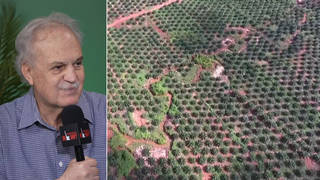HeadlinesDecember 27, 2019
Hospitals & Health Clinics Shuttered by Heavy Bombing in Idlib, Syria
In Syria, heavy bombing and fighting in the northwest province of Idlib has forced at least two hospitals and 14 health centers to close, as tens of thousands of civilians continue to flee the Russian-backed Syrian government offensive.
Aid groups say nearly 200,000 Syrian civilians have fled toward the Turkish border as Syrian government ground troops advance into the last major rebel-held territory. Approximately 3 million civilians live in Idlib — many of whom have already been displaced from other parts of Syria during previous rounds of fighting. This is Omar Hafyan, whose family has taken shelter in a mosque near the border with Turkey.
Omar Hafyan: “We were sitting at night, and suddenly we were hit by missiles during the night. The next day, we left everything behind and left because of the intensity of the airstrikes. In the morning, jets also struck our neighborhood. Due to the intensity of the shelling, we wore our clothes and left. We faced difficult conditions, and we reached here.”
Japan to Deploy Destroyer to Middle East Amid Rising Tensions in Gulf of Oman
Tensions are rising in the Gulf of Oman, as China, Russia and Iran begin four days of military drills in the significant commercial shipping area and Japan announces that it will deploy a destroyer to the region early next year. The Gulf of Oman has become a center of geopolitical tension after an unidentified party attacked two oil tankers there in June. The White House blamed Iran for the attack, which Iran denied.
Nigerian-American Journalist Omoyele Sowore Released from Prison
In Nigeria, prominent Nigerian-American journalist and activist Omoyele Sowore has been released from prison on bail. Sowore walked free on Tuesday, the same day as the release of former presidential national security adviser Sambo Dasuki. Sowore is a former presidential candidate in Nigeria and the founder of the New York-based news outlet Sahara Reporters. He has long worked to expose government corruption and abuse. He was arrested on August 3 after calling for protests against the government. Sowore now faces trial for treason and other charges that his supporters say are politically motivated.
In India, Protests Rage Against “Anti-Muslim” Citizenship Law
In India, protests against the controversial new citizenship law continue to rage, with more demonstrations planned for today. The law provides a path to Indian citizenship for undocumented immigrants from Afghanistan, Bangladesh and Pakistan — unless they are Muslim. The law’s critics say it’s a step toward the official marginalization of India’s 200 million Muslims. At least 25 people have died amid the government’s crackdown on the demonstrations. This is one of the protesters in Bangalore.
Protester: “It seems like they are trying to pretend that they are not hearing us, but they will hear us. We are not going to stop today. We are not going to stop tomorrow. We are going to stop when these acts are repealed. We are going to stop when they hear us, when they actually look at us and tell us that we heard you, when they actually take an action that is acceptable to us. Only then will we stop.”
Netanyahu Staves Off Party Leadership Challenge Ahead of General Election
Embattled Israeli Prime Minister Benjamin Netanyahu has staved off a party leadership challenge, despite being indicted on corruption charges last month. On Thursday, Netanyahu easily won a primary vote within his conservative Likud party. This means Netanyahu will once again lead the Likud party in Israel’s third general election in a year — after Netanyahu twice failed to form a coalition government.
Mexico to Bring Complaint Against Bolivia’s Interim Government to ICJ
Mexican officials say they plan to file a formal complaint in the International Court of Justice against Bolivia’s interim right-wing government over the presence of security forces outside Mexico’s Embassy in La Paz.
Mexican President Andrés Manuel López Obrador granted longtime Bolivian President Evo Morales asylum in Mexico in November after Morales was forced to resign under military pressure. Morales has since left Mexico for Argentina, where he was also given refuge. Mexican Foreign Minister Marcelo Ebrard said the alleged harassment of Mexican diplomats in Bolivia violates international treaties and the right for countries to grant asylum.
Marcelo Ebrard: “Not even in the worst moments of the military coups of the '70s and ’80s was the integrity of Mexican embassies and their residents put at risk. And it's an internationally known principle, across the entire international community: the respect of the right to claim asylum.”
Congolese Asylum Seeker Died in Border Patrol Custody on Christmas Day
In immigration news, a 41-year-old Congolese asylum seeker died on Christmas Day in a Customs and Border Protection holding facility in Laredo, Texas, only one day after she arrived to the U.S.-Mexico border with her family. CBP said she was medically screened after she provided paperwork highlighting a previous medical condition. On-site medical personnel reportedly cleared her and transferred her to the holding facility for processing. A press release from CBP says the woman, who has not been identified, complained of abdominal pain and vomited before she was transferred to a local hospital, where she died on December 25. The woman’s family has since been released from CBP custody. Her death comes less than one week after a 56-year-old Nigerian man died in Maryland while in ICE custody.
Los Angeles Prosecutors Consider Filing Criminal Charges Against Weinstein
In Los Angeles, prosecutors are considering filing criminal charges against disgraced Hollywood film mogul Harvey Weinstein, who has been accused of rape, sexual assault and sexual harassment by over 100 women. The Los Angeles County District Attorney’s Office is currently reviewing eight cases against Weinstein, who is already facing four criminal sex crimes charges in New York. In an interview with the New York Post earlier this month, Weinstein said he was a “forgotten man,” and claimed he should be remembered for his film contributions. In response, a group of 23 women, including top actresses, responded in a statement, saying, “[Weinstein] says in a new interview he doesn’t want to be forgotten. Well, he won’t be. He will be remembered as a sexual predator and an unrepentant abuser who took everything and deserves nothing.”
Most popular
- 1
- 2
- 3
- 4
Non-commercial news needs your support
Please do your part today.











Media Options